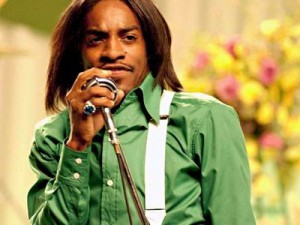Andre 3000’s hit single “Hey Ya!” is a gleefully hyperactive song, fusing a classic rock sensibility with a modern, funky chic. It exploded on the scene in 2003, in a strange moment, when Outkast, a duo with a string of underrated, entertaining albums from Southernplayalisticadillacmuzik to Stankonia, decided to release separate ones. They weren’t splitting; they were exploring different things. Speakerboxx/The Love Below was the outcome. At the time, critics marveled over Andre 3000’s The Love Below’s eccentricity and random energy, and casually accepted Big Boi’s Speakerboxx. What makes this particularly weird is that Speakerboxx was inherently the better product, a fact that’s much more obvious today by most mainstream musicphiles. The Love Below is a nifty experiment, but there’s a really blatant truth here, which is most obvious on “Hey Ya,” but has yet to be quite understood: Andre 3000, while a great rapper, isn’t a good musician.
“Hey Ya” bounces and rolls with the immensity and grandeur that a great pop song can be. It works well in clubs and parties, and brightens the spirits as it bounds through its synths, basses, and fake guitar/xylophonist melodies. It’s great as a wonderful 50s-esque rock homage; not so much as a modern rock song. Andre 3000 cut his teeth as a rapper, so his voice is barely registering in this song (mainly due to the fact he can’t hit the notes, choosing to drown his voice out instead). I don’t hate “Hey Ya” (although I never loved it). It’s good, but it’s good with an asterisk.
The middle of aughts was a really, really strange period. It was around that time that Youtube REALLY hit its stride and entertainment across the board started to pick up. Artists were finding success in niches, and it seemed that executives were trying to find the formula for recapturing the splitting markets. Options? Catering to new demographics was an idea – Desperate Housewives, The Sex in the City movie. Another option was experimentation. It worked in the early 90s, when animation ripped into the TV landscape with new, bold stuff. And in desperate times, why not try it again?
Lost was such an experiment, the ABC, 6-season mindfuck that, well, didn’t turn out to be a mindfuck. A moment in time, the perfect moment for a drama to break the landscape for what could be shown on TV. It was, essentially, an art film as a TV show. Expertly acted, crafted, designed, and displayed. A buffet of skilled workmen behind the scenes, who, despite what the most hardened critics say, left viewers and audiences unsatisfied. Period.
What happened in the post-Lost TV world was, well, nothing. The real TV-game changers were The Office, Adult Swim and 24. The Office defined Thursday night comedy for NBC, and while not a ratings-smash, defined new niche comedies that a network could expunge. Adult Swim opened the niche of singular voices in animated and non-animated comedy. 24, while ridiculous, pretty much defined serial television, showcasing the ability to not possess self-contained shows to be a hit. In the advent of DVRs, Netflix, streaming, and torrents, it seems strange that television is still marred in the classic mode of storytelling. Although, it is starting to break.
The truth is, Lost did not end well. It failed to tie in its plot lines, it failed to define a followup (some people suggest Fringe, although that’s more akin to X-Files), and, well, even as a casual fan of the show, there’s no desire to go back to it. The strange thing is, Lost, like “Hey Ya,” had so much raw impact at an individual level, but came to mean nothing in the end. “Hey Ya” falls in being sung by a not-good singer on a weird but not-that-great of an album. Lost, with no strong narrative and no real endgame, failed as a TV show. Good, but with asterisk.
I also humbly submit Pan’s Labyrinth as the film equivalent of good, asterisked media. Guillermo Del Toro is an craftsman director, a visionary into the heart of creations and monsters – a modern day Henson, more or less. And while Pan’s Labyrinth had the rich fairytale rhythms and acting that hit all the right notes, it was a not-so-consistent story. The “fairytale” theme became more of a gimmick, an excuse for characters to randomly act out of character. Looking back on the question of its dream/non-dream settings, I keep wondering why and how the film managed to get to certain points without acting wildly out of sync. I can’t imagine re-watching this without a rub of the chin and a cock-eyed expression. Who has it in their top fifty films? What did we really like about this again?
The asterisk is there because I want to be clear: this is different that the typical cultural embarrassment that we’re usually engaging in. This isn’t the Macarana, 80s power rock ballads, bland raunchy comedy, 60s animation, or other forms of entertainment that was terrible content-wise AND media-wise. “Hey Ya,” musically, is solid, just as Lost was masterful television and Pan’s Labyrinth visually arresting. But as “music,” as “game-changing TV,” as “the cinematic experience,” these three mid-2000 reeked of some missing element, a lack of commitment to the real core issue – entertainment that was aggressively “forest for the trees.” In other words – Andre 3000 can’t sing, Lost failed to have an endgame, and Pan’s Labyrinth’s characters made too many uncharacteristic decisions.
Today’s entertainment seems to have taken the lessons ultimately learned from this and created… well, not better-quality material, but better contained material. Although if Terra Nova, the DC comic reboot, and Thundercats (more on this later) are the norm, then we may just be coming back full circle.



#1 by C. Young on August 28, 2016 - 12:11 am
See, this is why I like you and your writing. You give detailed reasons why a song, TV show, movie, etc is worthwhile or not. Most people don’t do that these days.